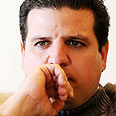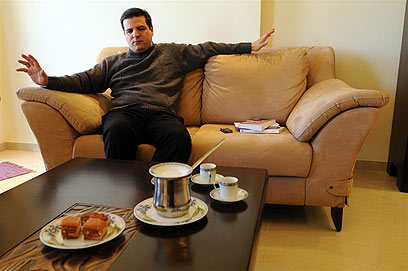
Auda. There are things one is born with
צילום: דורון גולן
Hadash leader: Elections are between enlightened, conservative
He acknowledges need for State's Jewish symbols, but alongside Arab ones. His views are differ from those of Islamic Movement, and he believes if Left continues stuttering it may disappear. Ayman Auda explains to Ynet why occupation is root of evil
About two months before the Knesset elections, the Jewish-Arab Hadash party draws a lot of strength from the municipal elections: Not only did their candidates win in 15 local councils, but Knesset Member Dov Khenin – who was accused by many of having disrespect for the national flag and anthem – gained a significant achievement in Tel Aviv, the stronghold of Israeliness.
"There's no doubt that the Israeli society is becoming sober and more civilian, compared to the recruited society which used to exist here," says Hadash Secretary-General Ayman Auda.
"Historic battles show that only those who chose to go together – in our case on a Jewish-Arab road – are the ones who won in the end," Auda tells Ynet.
But before Jews and Arabs cross their arms together, the power is being split within the Arab sector, with another party led by MK Abas Zkoor (United Arab List-Ta'al).
"This is just a gimmick," Auda says of the new party, and talks of a possible unity with Balad, after past differences have been overcome.
"The ideal situation," says the secretary-general, "would have been to run for Knesset in two lists – one patriotic-progressive-social with Hadash at its center, and the other patriotic-conservative with the Islamic Movement at its center… The Arab society will determine which society we seek – an enlightened progressive one or a conservative one."
At the moment, Auda expects Hadash to gain four Knesset seats, after being joined by the Tarabut left-wing party. "When the left-wing parties in Israel stutter, we are the real alternative," he says.
Auda explans that the disagreements between the rival Arab parties are real, and do not revolve around egos and seats.
"Abas Zkoor thinks we're not allowed to talk about the Palestinians' issues, and I say – is only (Kadima minister) Gideo Ezra allowed discussing these issues in the Knesset? It's our right and duty, although it's clear that the Hadash MKs mainly dealt with internal matters in the past Knesset."
As for the Islamic Movement, Auda says "there is a huge different between our perception and theirs, both socially and in terms of women's status. I don't see us running together.
He adds, however, that his party has been holding talks with Balad in recent days. "First we must resolve the events of the past. We'll check why they wanted to get close to anyone who conspired against us, why they viewed Hadash as the main enemy. Then there is definitely a possibility of a joint list, which won't fail on matters of seats."
Jews told a different story
Auda, 34, is considered by Hadash members the person who brought about a revolution and managed to arouse party offices which had been weary for years. "In the past month and a half I've managed to visit all of our 67 offices," he says.
He was born and raised in Haifa in the house of Hadash supporters, and has always been active – in the classroom, in the student council and in the city council. He recalls how his house turned into the main headquarters during election times. "There are things one is born with… I breathed politics from an early age."
As a person who grew up in a mixed city, he remembers how "From an early age I realized there wasn't one truth. The Jewish children, with whom we played football, would tell us how you won the war in 1956 and 1973, while I knew that we won it.
"I always asked myself how could they be telling a different story and why do they know all the details I don’t. That's why I chose to be in Hadash, where the issue is not Jews against Arabs. We search for a way to live together, and it's no secret that this is a complicated thing.
"If we sit now in a café in the center of Haifa and speak Arabic, no one will raise an eyebrow in wonder. Here most of the people are of Ashkenazi origin, and they are more accepting of us. Members of the oriental ethnic groups appear to feel inferior, and they are less accepting of us. But it always only reaches the line of equality: You want to be a handyman in our neighborhood? Fine. More than that is already a problem."
And how do you see it? "I'm not saying the Arabs are different. My grandfather and his friends would listen to (former Egyptian President Gamal Abdel) Nasser and rub their hands with pleasure, asking him to win. In the morning they would go to the Jews and say, 'We want to work.'"
Auda views the occupation as the main thing to blame for the current situation, saying that was the reason there is no chance Hadash will ever be part of the government.
"Ending the occupation will generate a spirit of peace and optimism, which will lead to a joint life and economic prosperity. I believe that despite everything, the two people are searching for the warmth, seeking to live together. Although I'm a minority from a numerical point of view, I feel like I belong here. My continuity here is natural."
Auda does not accept the term "a state of all its citizens" literally. He believes that the Jewish symbols should continue to exist – alongside the Arab ones. From an economic and civil point of view, there is need for complete equality. He wants to see a state maintaining the collective rights of both people – the language, the character and the education.
"I have no problem having something Jewish in the symbols on the streets, in the flag, in the anthem – but not only Jewish. The State's character must represent both people. Countries where there is national baggage have reached a situation of bi-nationality. I definitely understand the Jewish baggage of the Holocaust, the fact this is their only country – alongside the Arabs' Nakba an the feeling that we were once the masters of the world."

'I have respect for differences' (Photo: Doron Golan)
Auda, a lawyer in his profession, is married to the sister of Asil Asala, who was killed with 12 other Israeli Arabs in the October 2000 clashes with the police. His wife's parents were never members of Hadash, and bitter arguments are held around the dinner table.
"I have respect for the differences between us, and believe me that to this day I have no idea which party my wife voted for in the last elections," he says.
Asil's photo stands in his living room, and this year Auda joined the initiative calling for an international inquiry into the October events. Some 250,000 people have signed the petition, with most of the signatures collected by Hadash activists. But Auda doesn't have much hope" After Iraq, I'm not so naïve to believe that the world will wake up and do something about 13 young men."
Analyzing the political map in Israel, he sees a clear picture. "The Labor Party and centrist parties haven't presented an alternative of real peace or optimism among the public, and have thus shot themselves in the leg. They fell in love with the peace process, but not with peace itself.
"The Right, on the other hand, knows exactly what it wants. It speaks in a clear and unequivocal manner, and is therefore growing stronger. If the Left fails to wake up and lead to a clear road, a clear saying – it will eventually disappear. People want a party which knows exactly what it has to offer, not a stuttering party."
The Hadash secretary-general believes that after the upcoming elections Israel will have "a weak, dangling and dangerous government". Today's Likud is not the Likud of former Prime Minister Ariel Sharon, he says. "If (Likud Chairman Benjamin) Netanyahu isn't very radical, his friends will bring him down."
And in two years, Auda believes, Israel will face new elections.










